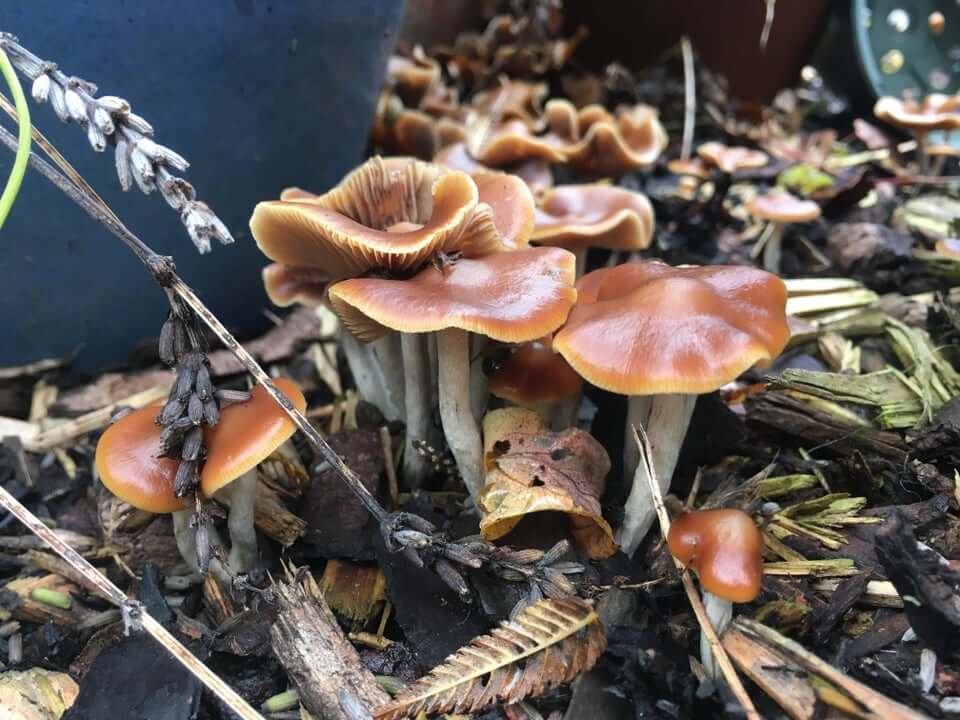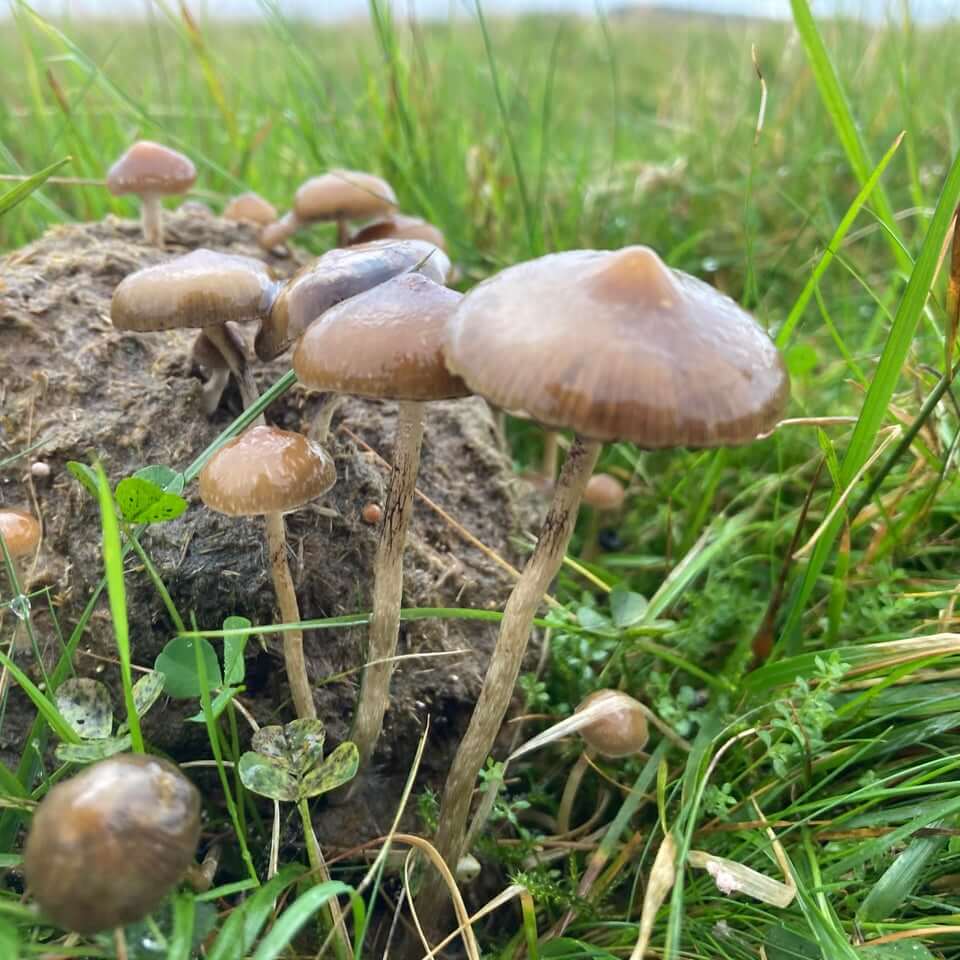It’s mushroom season in the northern hemisphere. And that means that the green and pleasant fields and forests of the UK are littered with fungi – some of it of the psychedelic variety.
However, it’s not wise to start picking and eating wild mushrooms if you’re not exactly sure what they are. This is because, while some can open the doors of perception, others can close the doors of life (as in kill you).
Which is why I thought it would be useful to put together this handy little guide to identifying a few wild magic mushrooms in the UK. While this list only covers five species, there are many more.
Happy foraging!
Psilocybe semilanceata (Liberty Cap)
Known in the UK as Liberty Caps, or simply Libs, psilocybe semilanceata is the most well-known and common magic mushroom found in the UK – and many other countries.

Standing 4-10cm tall, the mushroom has a distinct conical to bell-shaped cap that grows to about 2-2.5cm. It also has a small nipple-looking lump on the top of the cap. Liberty caps are a creamy yellow to brown and become quite pale when dried.
They generally appear alone or in small clusters on rich soil in pastures, meadows and parkland. They don’t grow on cow or sheep dung, but are common in areas where livestock may roam.
You are most likely to find Liberty Caps in late summer and throughout autumn.
Psilocybe cyanescens (Wavy Cap)
Also known Wavy Caps, psilocybe cyanescens is a small but potent psychedelic mushroom. Its caps grow to about 1.5cm to 5cm across and are distinctly wavy. They are a caramel brown when fresh and get pale as they dry.

Like many strong psychedelic mushrooms, they stain blue when damaged or bruised. This is thought to be due to the oxidation of psilocin, which is a psychedelic compound very similar to psilocybin. In fact, psilocybin converts to psilocin in our gut when we eat magic mushrooms.
Wavy Caps can appear in massive quantities, like when 100,000 of the wavy fellas were found growing alongside a English racetrack. The mushroom can be found on mulch or wood chips from October to February.
Psilocybe fimetaria
Psilocybe fimetaria is a widely distributed but not very common magic mushroom that grows in the UK. It can grow up to 9cm tall and has a small convex cap just a few centimeters in diameter. It’s pale red to brown in colour, and turns yellow when dried.

These rare magic mushrooms grow in either small groups or singularly on horse or cow dung. They’re most likely to be found in grassy areas with rich soils from September to November.
Check out the subreddit r/fimetaria (where I got the above photo from) for help identifying psilocybe fimetaria.
Gymnopilus purpuratus
Gymnopilus purpuratus grows all over the world, including in the UK. It has a rough, rust orange cap about 1.5cm to 6cm in diameter, with a brown red stem.

A chemical analysis found that this species contains 0.34% psilocybin and 0.29% psilocin. It grows in clusters on dead wood, dung, and mulch across the UK.
Inocybe corydalina
More commonly known as the greenflush fibrecap, inocybe corydalina contains a small amount of psilocybin and is known to grow in British forests under deciduous trees and under conifers.

It grows up to 10cm tall and has a wide brown cap up to 5 cm in diameter. Look out for it in autumn.
When to Collect Magic Mushrooms in the UK
One of the many brilliant things about mushrooms is the resilience that is afforded to them by their underground network of mycelium. This subterranean body (which truffles are part of) allows mushrooms to remain mostly dormant before shooting out of the ground in mere hours.
Therefore, timing is very important when searching for magic mushrooms.
Autumn is the best time for magic mushroom hunting in the UK. This is because most funghi love the wet, mild conditions in our countryside. The months of September to November are most productive for foraging.
You’ll maximise your luck by going out the day after a night of light rain. You may even want to check the same locations more than once as mushrooms can spring up overnight.
Dry weather and cold are not conducive to hunting mushrooms. If it’s uncharacteristically hot there’s frost on the ground, don’t bother.
Where to find magic mushrooms on the UK
Magic mushrooms grow in all sorts of environments, but woodland, naturally fertilised meadows, and any large area of grass or fields all offer ideal conditions for various species.
You shouldn’t have to go far to find some magic mushrooms in the UK. Local parks, common recreational areas, race tracks, woodland and country paths are all potential growing spots.
Psilocybin mushrooms have commonly been found in London’s Hyde Park, Primrose Hill and Richmond Park.

If you need some tips for local spots where magic mushrooms have been seen before, check out MagicMushroomMap.com
How to grow your own magic mushrooms in the UK
By far the safest and most reliable way to get your hands on magic mushrooms is to grow your own.
Growing mushrooms is fun, rewarding and relatively straightforward to do. However, there are a few steps you need to take so read through this guide.
You can also buy magic mushroom grow kits in the UK, as well as spores of all loads of different species of psilocybin mushroom. Click here to read ‘where to buy the best magic mushroom grow kits in the UK.
UK laws on magic mushrooms
Any fungus that contains psilocin or psilocybin is controlled in the UK. Therefore, magic mushrooms are prohibited to be cultivated, possessed or sold under the Misuse of Drugs Act 1971.
Magic mushrooms are classed as Class A drugs in the UK, meaning the most severe punishment for possession is up to seven years and an unlimited fine. However, sentencing this harsh a sentence is extremely unlikely.

In fact, if you were caught with a small amount for personal use – say up to 5 grams – you’d probably get away with a caution.
It’s a different story if you get caught growing them, though. Technically, a life sentence is the maximum sentence for supply of any Class A drug, including magic mushrooms. In practice, however, longer sentences are only used for major traffickers, and rarely, if ever, for cases involving only mushrooms.
Psilocybin and mental health
Psilocybin has shown promise as a highly effective antidepressant and is currently in trials for depression, smoking addiction, PTSD and anorexia.
It’s also proving to be very helpful in treating end-of-life anxiety by helping terminal patients come to terms with their impending death.
Being one of the safest drugs, psilocybin is casting off its reputation as a wonky drug for hippies and drop outs and is now being recognised as a powerful medicine that will play an important role in the future of mankind’s mental wellbeing.
I personally used magic mushrooms to help with creativity, confidence and inflammation. I usually microdose some home-grown shrooms once or twice a week.
The importance of Lion’s Mane
Lions Mane is a neurogenic mushroom, meaning, like psilocybin, it has to ability to promote the growth on new brain cells. In this way, it shares many of the same neurogenic qualities as psilocybin but with none of the psychedelic effects.

Not only will Lion’s Mane assist your neuroplasticity and general wellbeing, but it also holds many of its own individual health benefits such as protecting against dementia, reducing symptoms of anxiety or depression, and helping repair nerve damage.
See our unique selection of Lion’s Mane extracts here. Buy mushroom coffee here.
Summary
It’s magic mushroom season in the UK. If you’re interested in gathering some naturally-occuring psilocybin down your local park, then now’s the time to get the wellies on and get out there.
There are a few different types of magic mushrooms growing wild in the UK, but the one you’re most likely to see are liberty caps.
Always be very careful when picking and eating mushrooms, however. Don’t consume it if you’re not 100% sure what it is. It’s best to have an experienced mycophile with you.
If you sign up to our newsletter below, we'll send you a handy infographic that will help you identify liberty caps....







11 comments
What about Psilocybe crobulus. The big Roger Philips book says it’s hallucinogenic. Or is that synonymous with P fimetaria?
What about Psilocybe crobulus. The big Roger Philips book says it’s hallucinogenic. Or is that synonymous with P fimetaria?
Ineterested.
Ineterested.
i am from the isle of man and have noticed over years of picking areas with sheep, golf courses and coastal headlands are the best for liberty caps, safe tripping everyone 👍